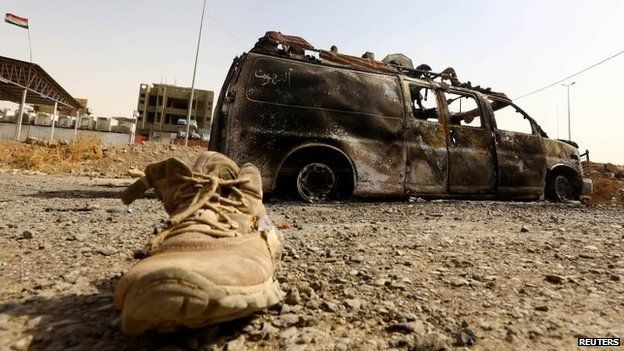Iraq crisis: Where next in the struggle for the country?
- Published

For much of last week the battle for Iraq entered a kind of strategic pause, in which both sides attempted to adjust to the capture of Mosul and Tikrit by Isis and prepare their next move.
Over the past couple of days it has become clear this lull is over and that it is Iraqi Prime Minister Nouri al-Maliki's opponents who have got their act together first.
The first priority for the loose alliance Sunni militants, spearheaded by the jihadists of Isis (the Islamic State in Iraq and the Levant), was always going to be mopping up remaining government garrisons in the west rather than advancing on Baghdad as some proposed.
Bridgeheads
There were many reasons for this, not least that these army or police outposts were much closer; that they could serve as bridgeheads for government operations deep within the contested provinces; and that an assault on the capital would be extremely difficult.
So, in the past couple of days, we have seen the militants taking posts close to the Syrian and Jordanian borders, such as Rutba and Qaim, as well as renewing attacks on Tal Afar.
The signs are that the Iraqi forces have been defeated in almost all of these battles.
None of these fights - not even the loss of Mosul itself - could be described, in my view, as events of strategic importance. Whatever momentum they may have given the Sunni militants, they will probably not decide the fate of Mr Maliki or of Iraq itself.
The battle for the Baiji oil refinery and the looming fighting over the Haditha dam do however have the potential to give the death blow to his government.
Baiji, which produced 40% of Iraq's petrol, has already been the scene of fighting for more than a week.
Terrible odds
Its Iraqi army defenders have fought on against terrible odds, unlike so many soldiers who ran away, but in the process the refinery has been badly damaged.
Isis has already claimed several times to have taken the refinery but even if the latest claim is not true, it seems to have been put out of action for the foreseeable future.
Petrol has run short in much of northern Iraq and this could hamper operations by the Kurds badly.
The Haditha dam, with its water and power supply to Baghdad, is also an extremely sensitive point for the government.
During the US invasion of 2003, forces were careful to secure Haditha early on with a raid by special operations forces.
The loss of Haditha, or sustained disruption of power or water to the capital, could play in the jitters of the city's residents, increasing the atmosphere of powerlessness and government incompetence.
Dispiriting defeats
From the government perspective, the loss of isolated forces that had been showing some fight - in Tal Afar, Baiji, or Qaim - is doubly dispiriting.
A couple of these posts had been reinforced with units that were considered more effective, adding to the loss of troops that Mr Maliki can ill afford to be without.
Meanwhile, the masses of chanting amateurs who have been herded on to army trucks and buses are receiving basic training in places like Taji, the military camp to the north of Baghdad where a few years back, the Americans churned out dozens of newly made Iraqi army battalions.
There has been talk of sending them into action after as little as one week's training, and the government, sensitive to the allegation that the men could form new Shia militias, is insisting they will be embodied within proper army and police units.
In trying to consolidate the new recruits, regroup the broken remnants of some of the northern garrisons, and retake lost ground, the key factor will be leadership.
It is the thing that has been most conspicuously absent so far, with accusations instead being levelled that generals have deliberately given up in Mosul and other places.
Hellfire missiles
Compared with the lack of effective command or inspiration, factors such as the Iraqi air force running out of Hellfire missiles are trivial.
The best that Mr Maliki and his allies can say is that they have halted Isis just short of places like Baquba, the town north-east of Baghdad that proved one of the most difficult, and costly, for US surge forces to conquer in 2007.
The longer though that the security forces fail to take the fight effectively to Isis and its allies, rolling them back, the more likely that the battle will shift to Baghdad itself.
An overt, head-on advance by a fleet of pick-up trucks flying jihadist black flags is unlikely.
Instead other scenarios are causing dread among the city's inhabitants.
Sunni militants could choose to send increasing numbers of truck bombs, rocket or mortar attacks into the capital as they did in 2005-6.
Or they could choose to incite open revolt among the people in Sunni neighbourhoods.
In either of these scenarios, the potential for large-scale, inter-communal violence is deeply worrying.
Pressure mounting
In recent days, thousands of Shia militia have been parading in Sadr City, and it is the possibility of them taking revenge against Sunni neighbourhoods, or indeed embarking on an "ethnic cleansing" campaign, that has already caused thousands to flee those parts of the city.
What all of these trends add up to is a picture in which the pressure on the prime minister and his security agencies is mounting swiftly.
The implications for Iraq and the wider region will be grave if he does not concert some kind of effective response soon.